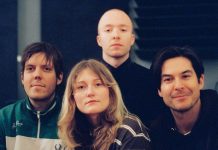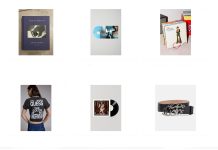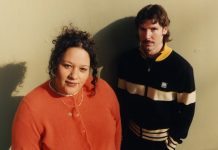At the Bob Baker Marionette Theatre, in the City of Angels, on one of the last nights of summer, unflinching stand-up comedian Margaret Cho delivers a filthy 10-minute warm-up set. Booming laughter melts into melancholic, honeyed hooks and pop-rock riffs as The Beths hit the stage. Flanked by fairy lights and red velvet curtains, the band passes out recorders for fans to play along as they test-drive their freshly pressed fourth studio album ‘Straight Line’s A Lie’ – while a motley crew of glittery puppets transfixes the crowd.
The juxtaposition sounds like a fever dream for most, but The Beths weave guitar-driven anthemic choruses with gnarly emotional truths and sharp, satirical wit – without breaking a sweat.
Fast forward a month, and frontwoman Liz Stokes and lead guitarist/creative collaborator Jonathan Pearce are at Strongroom Music Studios in East London. When we meet, they’ve just wrapped an interview with comedian, mate, and fellow Kiwi native Bret McKenzie – one half of New Zealand’s much-loved musical comedy duo Flight of the Conchords. They’re two hours away from beers at City Airport and boarding a flight to Dublin to begin a victory lap of gigs for their new album, including gearing up for a sold-out show at the legendary Roundhouse.
But before it all kicks off, The Beths have set aside time to chat about the duality at the heart of their music, what the future holds for the band, and how it feels to have their most vulnerable project to date out in the world.
In the studio, surrounded by a bank of recording equipment, it’s natural to assume they’ve spent the morning making tunes “No, this is just a backdrop to prove, like, ‘we’re musicians,’” Beth and Jonathan both laugh.
“It’s scary but it feels really nice to have ‘Straight Line’s A Lie’ out and sit back a bit. We’re calling this the “album honeymoon,’ our break in between where we can just fuck off a bit’” Jonathan jests. “You have this big push to finish the album, all the behind-the-scenes stuff to release it, and finally the curtain goes up and it’s out there. It belongs to people now to listen to.”
They riff on their attempts to use an Otamatone (a quirky Japanese toy synthesiser shaped like an eighth note with a face) for a track called ‘No Joy’, and the success of bassist Ben Sinclair’s breakfast-and-travel blog. Then trade wisecracks about Jonathan acquiring a rowboat with sails named Little Wing – after the Neil Young track, though Liz prefers to call it Lil Wing, like Lil Wayne – while Jon teases about picturing her impatience from her formative days as a trumpet teacher.
Jokes aside, Liz Stokes is no optimist and her pen game is at its finest when she’s heavy with mood. On The Beths breakout album ‘Future Me, Hates Me’, she sparred with her inner saboteur, and disdain for her own reflection and propelled Pitchfork to hail it as one of the most impressive indie-rock debuts of 2018.
That same year, they released a 7” called ‘Have Yourself a Merry Little Christmas’ which, alongside a cover of the traditional classic, featured a demo called ‘Happy Unhappy’ – a track Rolling Stone named “Song of the Summer.”
They supported The National and The Pixies, then jumped on tour with Death Cab for Cutie, and played SXSW, Primavera Sound, and Coachella, among many other stateside and international headline slots, eventually releasing their 2020 album ‘Jump Rope Gazers’.
Liz proved her lyrical prowess at its peak on their acclaimed, heart-wrenching third album ‘Expert in a Dying Field’, waxing poetic over the pain of a defunct relationship and catching the attention of U.S. President Barack Obama, who included a single on his famed 2023 summer playlist.
On ‘Straight Line’s A Lie’, the Auckland four-piece once again navigate the complexities of love, the numbness of depression, fractured relationships with parents, and the harsh, cyclical realisation that life is not linear. Sometimes striving for perfection and kicking down doors only gets you right back where you started. “Why does working on yourself and maintenance have to be so unsexy?” Stokes asks. “If I want to keep being me, I have to keep on top of that. If I love something, I need to show up and continually put time into what matters most.”

Where did you write ‘Straight Line’s A Lie?‘
Jonathan Pearce: We wrote it out in LA. We went to a lot of shows, watched a bunch of cult films – stuff by Kurosawa. We read Stephen King’s book On Writing and Working by Robert A. Caro, and listened to Drive-By Truckers, The Go-Go’s, and Olivia Rodrigo.
How did your time in LA influence your approach to music?
Jonathan Pearce: LA sometimes gets a bad rap compared to its cooler New York brother, but it has the same hustle – just a different flavour. People are very cool and encouraging; it’s very art-focused. For example, if I was back home in New Zealand and said we were working on new music, a friend might still ask me to come over and move his couch. In LA, if you tell someone you can’t drink because you need to write a song that night, they’ll go, “That’s so important! Why are you even here now? I have a microphone you can borrow.”
Liz, you wrote daily on a Remington typewriter while creating this album and, as a result, unearthed some very vulnerable lyrics. Tell me about your process.
Liz Stokes: The free writing was really good. I was doing that while I was still on SSRI medication, and it was really helpful. I struggled to write music, and I feel like the free writing was almost a ramp back into it. I was doing a lot of self-examination, just putting it all down on paper and then asking myself a lot of questions.
How many pages did you write a day?
Liz Stokes: Ten. Sometimes after about five pages I’d run out of things to say, so I started asking myself questions. I was examining old memories and the relationships I have with different people. Eventually, I had a stack of songs.
What’s the most personal track you’ve ever written?
Liz Stokes: I wrote a sort of stripped-back, guitar hymn on this album called ‘Mother, Pray For Me’, which is by far the most vulnerable music I’ve put out. I sing the lyrics, “I wanted to hurt you for the hurt you made in me,” but there’s so much love there. My mom is Indonesian, and there’s a communication barrier between us, as well as generational differences. We want to connect, but we exist on different planes. It’s scary to have it out there, but it was way scarier playing it for her.
How did that take place?
Liz Stokes: I’d built it up so much in my head. I’d been stressing about it for a year and a half since I wrote it, talking about it in therapy. Then, a week before our album came out, I realised the time had come to play it for her, she had to hear it first, I didn’t want her to be surprised. I was stressed the whole drive over. But it hit me – she might not totally absorb the song, and that’s fine too. I’d communicated it; it was for me to unpack, and maybe it’ll help other people with similar relationships with their parents do the same. In the end she liked it and said it was a very nice song.
The title track ‘Straight Line’s A Lie’ is a major hit about the spiral of constant upkeep. What other tracks are you most looking forward to playing live?
Jonathan Pearce: ‘Take’ is super fun to play live. It’s fast and furious – a good drumming song where Tristen plays this continuous 16th-note feel. I reckon ’Til My Heart Stops Beating’ is gonna fill some big rooms with some big feelings.
Am I right in saying the influence for ’Til My Heart Stops Beating’ came from the numbness you felt while taking SSRI medication for depression?
Liz Stokes: I wrote the chorus in the first month of being on antidepressants, when all of a sudden my brain was just quiet from the relentless anxiety I’d been experiencing. All the spiralling from depression paused, and I was just riding my bike around, sometimes in the rain like I sing on the track. I felt so alive and present in a way that just hadn’t happened in a really long time.
A trade-off for SSRI medication was that it eventually numbed your happy times too. Tell me about the inspiration for ‘No Joy’?
Liz Stokes: When you’re in the bottom of a deep hole and like, coming up for air the first time, that initially felt really great, it was really good! But after about a year and a half, I started to feel a bit level and quite numb. It wasn’t that I was sad. It was just that I didn’t like the things that I liked. I wasn’t getting joy from them. So it’s a pretty literal song.
It’s common knowledge that the salad days for The Beths took place when you were all studying jazz at University of Auckland. But how did you and Jonathan meet?
Liz Stokes: We’ve known each other since high school, playing in different bands.
Jonathan Pearce: Liz had a great folk trip called Teacups from 15-19. She was notable for knowing and busking every Jenny Lewis song on the street at first and then they put out their own album.
Liz Stokes: Jonathan was in a brooding indie band called Artisan Guns who wound up getting a major label deal. Which actually informed a lot of the decisions we’ve made in signing to labels.
What were those first gigs like?
Jonathan Pearce: The Beths started out playing house parties and small basement joints in New Zealand. Back then, if we could sell out the Whammy Bar — this really cool, classic dive bar that fits about 200 people — that was amazing. And we’d still know at least half of the people coming.
Liz Stokes: A really big moment was when we were putting on shows and suddenly people were coming that we didn’t know.
It’s a massive question, but what’s been your proudest accomplishment?
Liz Stokes: In 2019 we got asked to open for Death Cab for Cutie when we’d only just put our first album out. I was such a huge fan when I was younger, so that was big — but also, we were now playing these huge arenas for massive crowds.
Liz Stokes: It’s also really meaningful to me that we are a band – the four of us – and that we can keep being a band. It means a lot that we can support all four of us and keep making music together. I know that’s kind of a boring answer, but it really sticks out.
Jonathan Pearce: Being able to make music, and reach a point we can do it as a job, is a privilege and keeps us going. But if it wasn’t the Beths, we would all be gigging musicians back home. But we’re able to take our passion to the next level because labels like Anti and our previous label Car Park think about their artists in terms of their whole career and their life. “You want to make music? Okay? Yeah, we can work out what that looks like now, and also think about what it looks like in 10 years’ time.”
You’ve faced no shortage of adversity. What drives your passion to continue making music?
Jonathan Pearce: For me, it’s that we make music that’s meaningful to us, and the thought that it could mean something to someone else – that it could be their favourite album, a soundtrack to a sort of life moment – that’s what it’s all about. That’s the point of it.
Watch our last interview with Liz Stokes below







